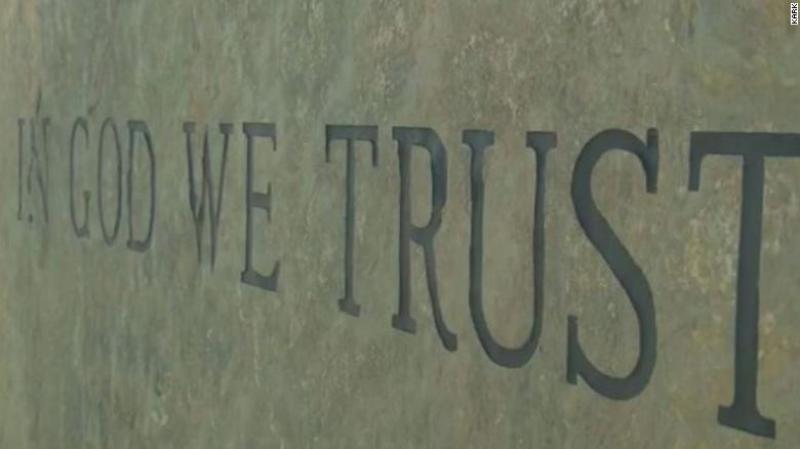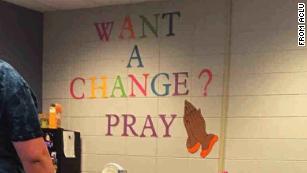'In God We Trust' signs to greet Louisiana students in new school year


Louisiana law requires the words "In God We Trust" to be displayed at all public schools.

(CNN) As Louisiana students gather supplies and class schedules for a new school year, administrators are ensuring legally mandated "In God We Trust" signs are hung in every public school building in the state.
Democratic Gov. John Bel Edwards signed a bill in May 2018 requiring the phrase be displayed in all public schools in the state by the beginning of the 2019-2020 school year.
The bill gives school administrators discretion over how the phrase is displayed, but there's "a minimum requirement of a paper sign."
The measure also requires students be educated on the history of "In God We Trust" and its status as the national motto.
Shelby Ainsworth, principal of West Monroe High School in West Monroe, Louisiana, praised the bill, telling CNN affiliate WAFB , "I still feel strongly that America is a Christian nation."
"There are varied opinions even amongst high school students, their parents, the communities, the different churches that are represented, different faiths that we have," Ainsworth told WAFB. "It's nothing hidden, it's nothing swept under the rug, but it's nothing forced upon anyone."
Other states require "In God We Trust"
Louisiana isn't alone in requiring the motto to be displayed in public schools. South Dakota Gov. Kristi Noem approved similar legislation in her state, which also goes into effect during the 2019-2020 school year.
The South Dakota bill protects schools from legal trouble that may arise from the move. Any schools that face a lawsuit or complaint as a result will be defended by the state attorney general at no cost. If the schools become responsible for legal fees or monetary damages, the state will take those on.
Florida enacted similar legislation in March 2018 when then-Gov. Rick Scott gave his seal of approval.
The Palm Beach Post reported in September 2018 that Palm Beach County school district approved displaying the Florida state seal, which includes the phrase "In God We Trust," instead of signs bearing the motto, after teachers raised concerns about separation of church and state.
CNN's Madeline Holcombe contributed to this report.







Guess they never heard of these cases, and those legislators have certainly not done their homework!
Engel v. Vitale (1962)
The Court looked at whether the daily reading of a state-composed nondenominational prayer in school violated the Establishment Clause of the First Amendment. In a 6-1 decision, the Court ruled that New York’s official prayer to begin the school day was an unconstitutional violation of the Establishment Clause. (Citation: 370 U.S. 421)
School District of Abington Township, Pennsylvania v. Schempp (1963)
The Court considered whether a Pennsylvania law and policy of the Abington School District requiring public-school students to participate in classroom exercises involving daily Bible verse reading violated the religious freedom of students under the First and Fourteenth Amendments. In an 8-1 decision, the Court found that the Pennsylvania law and school-district practice violated the Establishment Clause and the Free Exercise Clause. (Citation: 374 U.S. 203)
Murray v. Curlett (1963)
The Court examined this case in combination with Abington v. Schempp (1963), determining whether Baltimore, Maryland, public schools violated the Establishment Clause in conducting daily opening exercises involving reading of the Bible and reciting of the Lord’s Prayer. As with Abington v. Schempp, the Maryland school-day religious exercises were declared a violation of the Establishment Clause. (Citation: 374 US 203)
Lemon v. Kurtzman (1971)
The Court considered whether a Pennsylvania law reimbursing religious schools with state funds for textbooks and teacher salaries for non-public, non-secular schools violated the Establishment Clause of the First Amendment. In an 8-0 decision, the Court set out a three-pronged test for the constitutionality of a statute, by which a statute is constitutional if: (1) it has a primarily secular purpose; (2) its principal effect neither aids nor inhibits religion; and (3) government and religion are not excessively entangled. On this basis, the Court struck down the Pennsylvania law as in violation of the Establishment Clause, finding that the statute constituted an excessive government entanglement with religion. (Citation: 403 US 602)
Stone v. Graham (1980)
The Court considered whether a Kentucky state law mandating the display of the Ten Commandments in public school classrooms violated the Establishment Clause of the First Amendment. Applying the three-prong test from Lemon v. Kurtzman (1971), the Court found 5-4 that the Kentucky law was unconstitutional, because it had no secular legislative purpose. The Court also found that by mandating posting of the Commandments under the guidance of the legislature, the state was providing official support of religion, which was a violation of the Establishment Clause. (Citation: 449 US 39)
Lee v. Weisman (1992)
The Court looked at whether officially approved, clergy-led prayer at public school graduations in Providence, Rhode Island, violated the Establishment Clause of the First Amendment. The Court applied the 3-pronged test from Lemon v. Kurtzman (1971) and in a 5-4 decision, held the practice to be a violation of the Establishment Clause. In the Court’s opinion, Justice Anthony Kennedy wrote that the state government’s involvement in the practice of the clergy-led graduation prayer was pervasive “to the point of creating a state-sponsored and state-directed religious exercise in a public school.” (Citation: 505 US 577 )
Santa Fe Independent School District v. Doe (2000)
The Court examined whether the state of Texas’ Santa Fe Independent School District’s policy permitting student-led, student-initiated prayer at football games violated the Establishment Clause of the First Amendment. In a 6-3 decision, the Court held that it did, upholding the appeals court’s earlier ruling. In their decision, the Court rejected the school district’s view that, because students controlled the pregame invocation by voting on and delivering its content, it was private speech protected by the Free Speech and Free Exercise Clauses of the First Amendment. Rather, Justice John Paul Stevens wrote in the Court’s opinion that it was public speech, because “the delivery of such a message—over the school’s public address system, by a speaker representing the student body, under the supervision of school faculty, and pursuant to a school policy that explicitly and implicitly encourages public prayer—is not properly characterized as ‘private’ speech.” Because of this and the context of the message’s delivery being an official school event, the school district’s policy impermissibly “involve[d] both perceived and actual endorsement of religion.” In addition, the Court applied the 3-pronged test from Lemon v. Kurtzman (1971), which the policy failed for having no secular purpose (prong 1), because it “was implemented with the purpose of endorsing school prayer.” (Citation: 530 US 290)
HI Hab, I haven't seen you in ages. How have you been?
As to the topic at hand, it's no surprise it comes from Louisiana. That state sure loves it's constitutional violations.
I've been good; a lot of changes in my life in the past couple of years. It's good to hear from you!
I'm not surprised that it's from Louisiana, either.
I'm glad you're back. You've been sorely missed.
So you want the courts to rule it unconstitutional for states to have laws mandating that the motto of the United States of America be made visible to their American citizen students?
It is unconstitutional for ANY government entity to endorse or support ANY type of religion. And the "motto of the United States of America" appears on our money, so students can view it at any time. I would also point out that MANY students in our public schools are NOT "American citizen students," and you would do well to remember that.
I also want to point out that many "American citizen students" do not practice any religion, either, as is their right.
You apparently missed the very first comment, " 1 Habibertina ."
The courts have ALREADY ruled it unconstitutional, multiple times.
The courts have ruled the showing of the motto of The United States of America in American public schools unconstitutional many times? Show me!
This is just a sign that people can choose to ignore.
All the cited cases above appear to involve some kind of mandatory participation, which of course is unconstitutional.
Not only that but In God We Trust is not a prayer but is on our coins and currency as our national motto. The Supreme Court already ruled that the religion of atheism can’t strike our motto off of our coins or make it unteachable at school. The pledge of allegiance and national motto are two items with religious religious references that militant atheists can’t take away from our kids at school.
Care to explain how atheism is a religion?
Does that stupid ploy never end? 'Atheism is a religion' is a line the likes of Kent Hovind, Eric Hovind, Ray Comfort and Ken Ham use. Not the most intellectually honest religious folks around. (For that matter, not the most intellectually anything ...)
Rather than pull truly brain-dead one-liners from the bottom of the barrel I suggest they start tapping quotes from Christians like Dr. Francis Collins or Dr. Hugh Ross. Those are two brilliant individuals who do not need to resort to cheap, transparent tactics like trying to cast atheism as a religion.
The key word there is "stupid." But comes as no surprise. I don't get why some people feel the need to describe or define atheism as a religion, especially if it's already been explained to them. It's like they can't fathom someone not having a religion or religious belief.
Barry Goldwater..... Where are you when your country needs you!
The Supreme Court has ruled that religion CANNOT be taught in schools.
Personally, I like the sign my brother in law who owns a garage has on his wall. "In God we trust. All others pay up front!".
I thought it was supposed to be "...all others pay cash".
It is, but this is the day of electronics. Just my own modern take on it.
You're right. Hardly anyone pays with cash any more, they use their smartphones in department stores and supermarkets, but if you're buying your vegetables and fruit direct from the farmer, you need your cash.
The motto of the USA is not religious and as our national motto it has a secular purpose.
I like it!
what's the secular purpose?
Sorry, but all of those cases deal with things other than requiring the displaying of our official National Motto.
But just in case you think you MIGHT have a leg to stand on...
you don't.
But thanks for playing!
I doubt that this has anything to do with the law or doing their homework..
It's, IMO, some red meat for the followers.
Seems like a blatant violation of the Establishment clause. This should be interesting.
How so is it in violation?
It's just a bunch of words that should have no meaning to non believers.
Why should believers get preferential reference or acknowledgment over non believers by the government? Or why should the government validate believers with such displays?
But it does not violate the establishment clause. If you think so, please explain.
See 4.1.17
See @4.1.7
Why does that matter in a constitutional question?
I would love to see how Christians would react if the signs read "In Satan we trust! Hail Satan!".
I mean, it's just a bunch of words that should have no meaning to non-Satanists, right?
Perhaps an acceptable compromise would be if they changed the signs to "Some of us trust in some God, some don't". At least it would be far more honest.
see 4.1.47
Next they will target any posters or signs with a flag and the pledge of allegiance being anywhere on a public school. The atheist lawyer Neudow lost on both the money and the pledge when he took both to the Supreme Court. He knew they would be islands of belief in a sea of secularism in our public schools as national government traditions and on that he was right. Those traditions and non school hours extra curricular clubs, off campus lunches, and meeting at the flag pole before school are things the atheists can’t take away from us.
Well actually under the equal access rule determined by the Supreme Court, they can take before and after school Christian clubs away if there are simply no extra curricular clubs offered by the school at all and they can take away Christian lunch gatherings if they close the campus and let no student leave campus for lunch anywhere, fast food, restaurants, home, the park nearby etc. I hear that there are school districts in the NE USA that are so concerned their students might be exposed to religious belief that they literally do close their campus for lunch and breaks and have no before or after school extracurricular activities on campus or sponsored by the school.
What about a religion that does not have a god???
So, your belief is to insult or ignore anyone that doesn't share your particular beliefs? How very Christian of you.
I’d like to see a brief from an ambulance chasing lawyer claiming that it’s unconstitutional to teach about the national motto of the USA, what is says and how it became our national motto in our public schools.
Odd that you are interested in what a slimy personal injury lawyer has to say about constitutional law.
Here's some words for you:
All HAIL SATAN!!!!!
The national motto has something to do with the establishment clause? I think that Newdow, the atheist religion lawyer already lost that round.
As I wrote, this should be interesting.
See @4.1.7
This requires spending tax money some of which was collected from people who do not trust god to put up signs. It makes those who do not trust god less welcome in school
If God were putting up the signs, I wouldn't have a problem with it. If God were out trying to convert others, pushing his faith on the masses, knocking on doors, calling other faiths 'fake', killing those he disagrees with, proclaiming 'Jihad' on non-believers and those of other faiths and telling all mankind how he meant for us to live, well I'd have no problem with that. Sadly, I've only ever seen humans claiming to be some Gods servants doing those things, and therein lies the problem. Apparently millions of religious persons don't have faith that their God can do anything for itself, so they eagerly come up with ways they imagine they are gaining his favor and approval, like forcing their God into schools, courthouses, the pledge of allegiance and just about every other aspect of secular society. It's almost like they believe in a handicapped God who can't do anything for itself and just waits on its believers to take action on its behalf. And when its believers get it wrong and imagine their God wants them to commit genocide or do some other horrible thing to other humans, their God supposedly still sits there apparently unable to act, unable to prevent them from murdering innocent women and children in its name.
where has he been all this time?
This week I am watching a documentary titled "The Family" on Netflix. The documentary is based on a book by the same name that was published in 2009. I wholeheartedly recommend the documentary to anyone who is interested on the men in our government who are behind abolishing the separation of church and state in the United States. This has been an ongoing movement for around 70 years according to the documentary. It is a non-denominational cult using Jesus as their central figure. This is not a Jesus of love, but a Jesus of power seeking to control and dominate the sheeple through his "chosen" rulers (who of course are self-chosen, but are equally self-deluded that they have been destined to rule).
For a quick timeline of "Religious Freedom" laws and some background on the people who stood solidly behind them check out the Time's article at the link below.